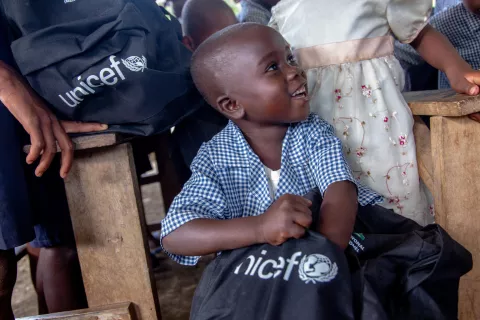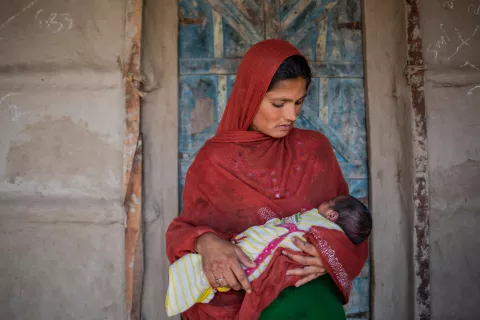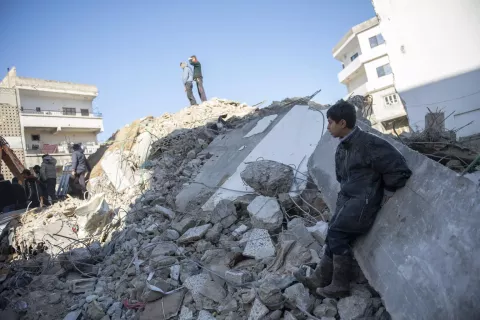Mothers take on malnutrition in Burundi
A series of bad harvests has left communities prone to food insecurity and malnutrition. Find out how trained 'light mothers' are working with communities to tackle malnutrition
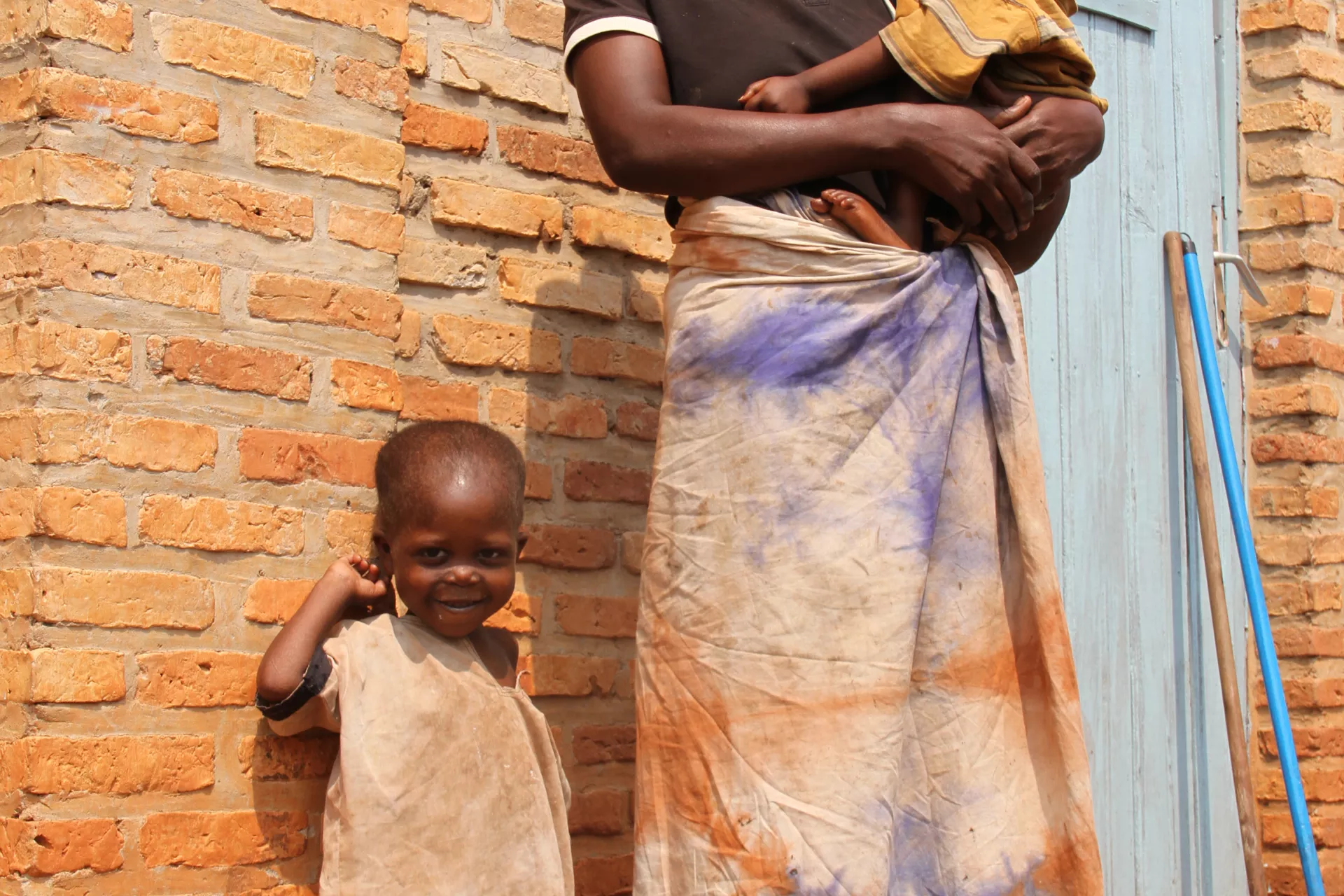
- Available in:
- English
- Español
With admissions to hospital for malnutrition on the rise in this vulnerable part of Burundi, something had to be done. So the community turned to a cadre of ‘light mothers’.
KIRUNDO, Burundi, 22 February 2016 – “Prices here have increased,” says Anastasie Sinzobakwira, cradling her son outside the Kirundo hospital. His name is Joseph. He is 5 years old, and severely malnourished. “One kilogram of rice was [BIF]1,200 last year, and now it’s 1,500. It’s the same thing with sweet potatoes. They were 1,000 before, and they’re 1,800 now.”
Anastasie is a widow. She sells coal at the local market in Gasura, Kirundo province, a few kilometres from the Rwandan border. “The children usually only eat once a day, in the evening,” she says softly. “If I don't manage to sell anything, then we just don't eat.”
This is the third time Joseph has been admitted to hospital for severe acute malnutrition. This time, his recovery will take about two weeks.
A dire situation gets worse
Joseph is not alone. Sixteen other severely ill children are being treated in the hospital’s cramped therapeutic stabilization room.
Families like Anastasie’s are finding it harder and harder to feed their children. The spike in food prices is linked to the onset of political crisis in Burundi. But even before the crisis began, four out of five Burundians were living on less than US$1.25 a day, and 58 per cent of children under 5 were malnourished.
Kirundo province is particularly vulnerable. It has one of the highest mortality rates in the country. A series of bad harvests has left communities prone to food insecurity and malnutrition. Repeated migrations connected to political instability have compounded the situation.
The head of Kirundo hospital’s nutrition ward, Déogratias Ayobibwira, sees the effects of this situation firsthand, noting the increase in admissions. “People no longer come to health centres regularly due to migration, and there is a real problem of increased poverty and lack of financial means,” he observes.
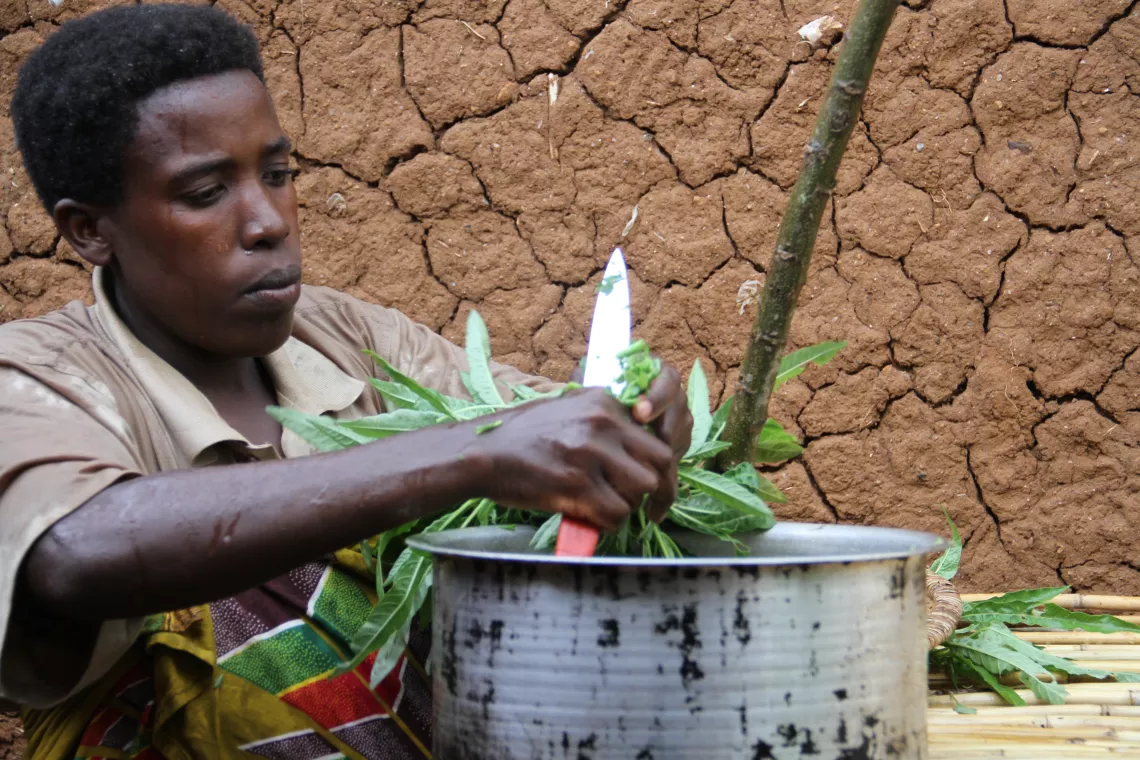
The mortality rate in the ward is 16.6 per cent, meaning that roughly one in six children who arrive in Kirundo hospital with severe acute malnutrition succumb. “It's much too high,” says Mr. Ayobibwira. “The rate started to increase at the onset of the crisis.”
In this precarious context, ensuring a steady supply of lifesaving medication is crucial. And yet, as state health budgets are slashed and bilateral aid to Burundi decreases, it is becoming more and more challenging. In the health centre in Marembo, a stockout of ready-to-use therapeutic food lasted three months – during which time health personnel had to send hundreds of mothers with malnourished children home to make do with what they had. UNICEF is working closely with donors and partners to respond to this quickly deteriorating situation.
Learn more about the humanitarian needs of Burundi.
Enter the light mothers
Tackling malnutrition is not just about saving the lives of children who are severely ill – it’s also about ensuring that communities know how to prevent their children from falling ill in the first place. That’s why UNICEF is working with partners to mobilize community resources to tackle malnutrition. The partners use a model called ‘positive deviance’, which looks to members of the community to create behaviour change that can help solve problems.
Here in Kirundo, a volunteer ‘light mother’ hosts a 12-day course for other parents, usually in her house. Light mothers lead demonstrations on preparing healthy meals of affordable local products, such as beans, rice and vegetables. They are also trained in screening for malnutrition using such simple tools as mid-upper arm circumference tape and a scale. So, mothers can track the progress of their children.

“Community engagement is key to addressing malnutrition,” says Marie-Claude Desilets, Nutrition Manager at UNICEF Burundi. “Empowering communities with knowledge about simple, affordable practices builds resilience and makes communities more able to cope with shocks, including rising food prices.”
Parents who attend these sessions also learn about other key practices, including handwashing with soap and birth spacing.
Light mother Sonia
Sonia Uwimana runs sessions in the courtyard of her modest mud house in Marembo. She has a handwashing device and a dish rack to ensure hygiene in the home, and out back, a kitchen garden planted with three different vegetables. This light mother can harvest from the garden to cook balanced and nutritious meals with essential vitamins and minerals for her children.
She uses her knowledge to teach key practices to other parents. “I teach them about breastfeeding, about preparing balanced meals that mix the three food groups, about family planning, hygiene and how to make a kitchen garden. We also teach mothers about stimulation of newborns – the importance of playing with them. Children need stimulation and psychological development.”
Jacqueline Twashimiye is a farmer and one of Sonia’s students. She brought her 2-year-old son Theonese to Sonia’s sessions.

“He didn’t have much appetite,” she remembers. “Maybe it was because I didn't prepare meals properly. Before, I used to prepare meals with whatever I had. Now I know that I have to add vegetables to the meals. And I add some sunflower oil and peanut powder. When we have some money, I try to buy avocado or fruits and give them to the children.”
Sonia weighs Theonese on the scale in her courtyard. Satisfied with his weight gain, she is confident that he will continue receiving nutritious meals at home.
He is not the first. “There was a 1-year-old boy who came here who was so thin, he had no energy to move,” Sonia remembers. “When he left the programme, he was able to crawl again. I was full of joy.”
Sustainable change
We meet light mother Mediatrice Mukanyamibwa, who is chopping a handful of amaranth leaves she has gathered from her kitchen garden. She remarks on the changes around her. “Now there is awareness of the importance of varied balance meals,” she says. “Most parents used to only give beans to their children here – adding in vegetables was not in their habits. But when we first planted kitchen gardens, people quickly saw that it was an easy way to grow vegetables.”
Alexandre Niyongabo is Project Manager at Concern International, a UNICEF partner in Kirundo province. He also sees the progress the communities have made. “Now we need to combine positive deviance with social protection and food security, so it can become a truly durable intervention,” he says.
In unsure times like these, it is communities who suffer. And it is the communities, themselves, who can bring positive change. With the resilience and optimism of mothers like Anastasie and the dedication of light mothers like Sonia and Mediatrice, the children of Burundi have a better chance to survive, and to thrive.
Back in Kirundo hospital, Anastasie takes a walk with Joseph and her other child, Sibomana. After 11 days of hospitalization and treatment with therapeutic milk provided by UNICEF, the swelling from his oedema has gone down. Joseph has newfound energy. If he continues progressing well, Joseph will be discharged in a few days.
But his smiles are no guarantee he will not be readmitted.
“I will do everything possible to make sure my children grow up well, despite my difficulties,” she says with a smile. “I try to be positive.”

